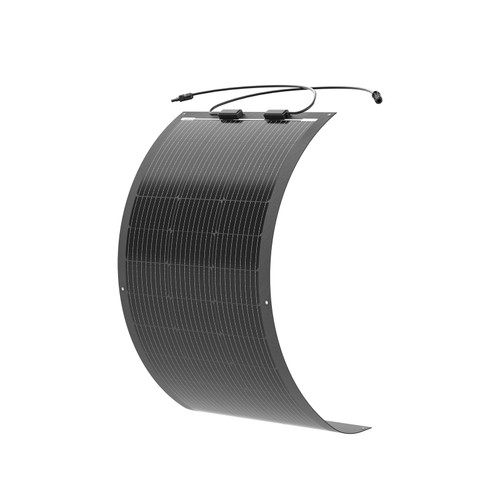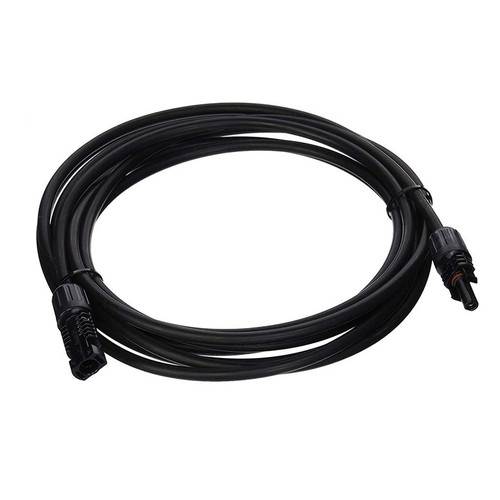
100 Watt 12 Volt Flexible Monocrystalline Solar Panel
$139.99
100 Watt 12 Volt Flexible Monocrystalline Solar Panel
$139.99
+
1390
Renogy Rays after purchase.
Learn more
- Flex up to 240 degrees.
- 5-Year product warranty & performance warranty.
- 9 BB Design for Higher Efficiency.
- IP67 Junction Box. IP67 Solar Connnectors.
- 0.08 inches thin & 5.3 lbs Light.
View More

Ultra-light and Ultra-thin Solar Panel, Industry-Leading Warranty
The Renogy 100W Flexible Solar Panel is an ideal choice for load-sensitive structures and uneven surface mounting. It features market-leading 5-year warranties on material and workmanship, as well as output performance.
Stable Output Performance over Time
This flexible solar panel features long-lasting stable power performance, maintaining at least 90% of output within 5 years, unlike others that can experience up to 50% loss of output within 6 months.
Industry-Leading Quality and Design
Ready for Installation
Package Includes
100 Watt 12 Volt Flexible Monocrystalline Solar Panel
x 1
Maximum Power at STC*
100 W±3%
Optimum Operating Voltage (Vmp)
20.7 V
Optimum Operating Current (Imp)
4.84 A
Open Circuit Voltage (Voc)
24.4 V
Short Circuit Voltage (Isc)
5.16 A
Module Efficiency
15.7%
Maximum System Voltage
600 VDC UL
Maximum Series Fuse Rating
15 A
Dimensions
43.0 x 22.9 x 0.1 in (1093 x 582 x 3 mm)
Weight
5.3 lbs (2.4 kg)
Connectors
Solar Connectors
Operating Temperature:
-40°F-176°F (-40°C-80°C)
Maximum AWG Size Range
12AWG
Temperature Range
-40°F-185°F (-40°C-85°C)
IP Rating
IP 67
CE, ISO 9001
Frequently Asked Questions
What do I need to complete my off-grid solar power system ?
A solar panel has to be connected a charge controller to regulate current, and a battery to store the electrical power. You will need adapter kit cables to wire the solar panel(s) and charge controller, and tray cables connecting the charge controller to a deep-cycle battery.
Why is my solar panel underproducing?
Solar panel performance may be hindered for a number of reasons. Most commonly environmental conditions such as indirect sunlight, temperature rise, cloudy sky, and dirt and stain buildup on the top glass will cause reduced power output.
How should I connect solar panels in my electrical circuit (series vs parallel)
It depends on your electrical circuit size and power demand. Connecting solar panels in series: their operating voltage output adds up. while system current output will be the same as that for one panel. Connecting solar panels in parallel: individual panels’ operating current output adds up to the system output current. while system output voltage will be the same as of one solar panel. To meet the optimum power output and system rating for your power system, you can use both parallel and series connections.
How many solar panels do I need ?
The best way to gauge how many solar panels you need, is to understand and define the power load needed from this system. Power is measured in Watts, and capacity is commonly measured in Watt-hours (multiplying power output in watts by the required number of hours of operation multiplied by a safety factor of 1.5-2). Therefore, it is wise to size your battery bank first based on the minimum required capacity, and accordingly decide how many panels or how much power input is needed.
Can I walk on flexible solar panels?
We suggest not. Walking on solar panels will exert excessive pressure on the small area, it may cause cracks and damage to the panel.
How to clean solar panels?
" You can clean the panels with a non-abrasive sponge and water. We suggest regular maintenance to wipe the dust, sand, and other dirts away. Built-up dirt and stain will reduce the power output of the panel. "















































